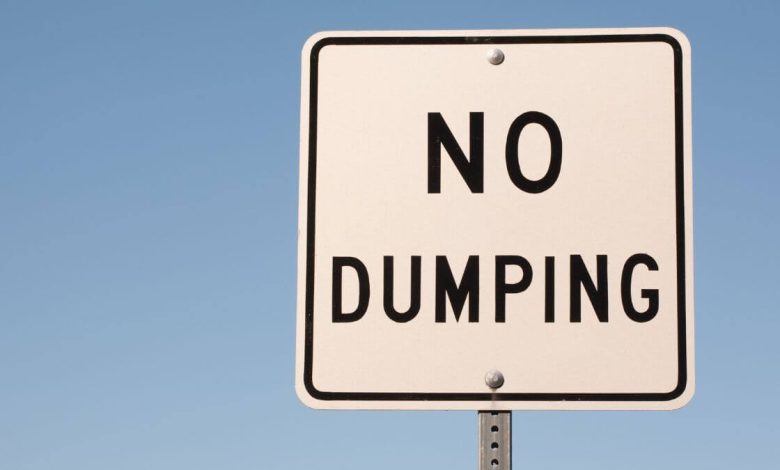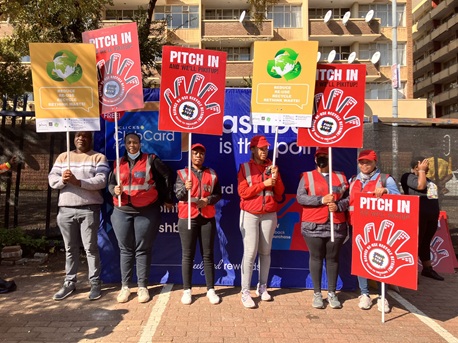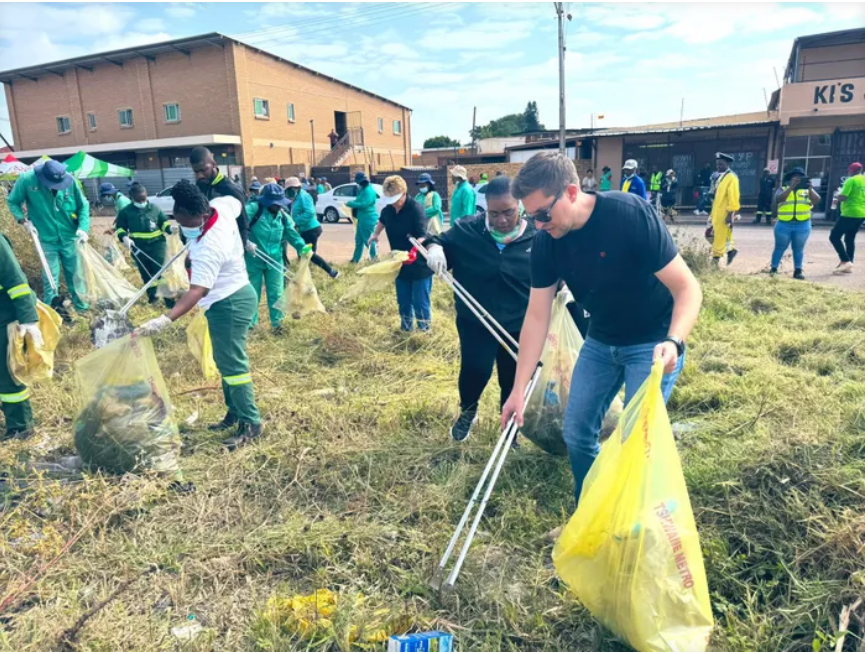Illegal Dumping in Gauteng: Why It’s Getting Worse

Illegal dumping in Gauteng has become one of the province’s most visible and damaging environmental challenges. From open spaces in Soweto to riverbanks in Tshwane, piles of waste are increasing despite municipal clean-up campaigns.

This problem is not just about unsightly rubbish it threatens health, property values, and the environment. So why is illegal dumping in Gauteng getting worse, and what can be done about it?
What Is Illegal Dumping?
Illegal dumping refers to the unlawful disposal of waste on land, water, or public spaces without municipal approval. It includes:
- Household garbage thrown on open fields or street corners.
- Businesses dumping rubble and industrial waste in empty lots.
- Construction companies avoiding landfill costs by abandoning waste along roadsides.
Under the National Environmental Management Waste Act, illegal dumping is a punishable offence in South Africa.
The Current Situation in Gauteng
Gauteng, as the country’s economic hub, generates more waste than any other province. Municipal reports show that:
- Johannesburg spends hundreds of millions annually on clearing illegal dumping sites.
- Ekurhuleni and Tshwane regularly identify new hotspots, especially near informal settlements and industrial zones.
- Rivers like the Jukskei, Klip, and Hennops are heavily polluted by household and business waste.
Despite ongoing clean-up campaigns, the problem continues to spread.
Why Illegal Dumping Is Getting Worse
1. Poor Waste Collection Services
Delays and missed collections often leave residents with no choice but to dump their rubbish illegally.
2. Rapid Urbanisation
With Gauteng’s population growing fast, housing development has outpaced waste infrastructure.
3. High Disposal Costs
Some businesses avoid official landfills to cut costs, especially for construction rubble.
4. Lack of Awareness
Many households don’t know how or where to dispose of waste legally.
5. Weak Law Enforcement
Few cases of illegal dumping end in prosecution, and fines are often too low to act as a deterrent.
6. Economic Pressures
Unemployment and poverty push communities towards convenient, but unlawful, disposal methods.
The Consequences of Illegal Dumping
Environmental Damage
- Rivers and wetlands are polluted.
- Harm to plants, animals, and water systems.
Health Risks
- Breeding grounds for rats, flies, and mosquitoes.
- Higher risk of cholera, malaria, and respiratory infections.
Social and Economic Costs
- Property values drop in dumping hotspots.
- Municipalities spend billions cleaning up instead of investing in services.
Crime and Safety Concerns
- Dumping sites attract criminal activity, making communities unsafe.
Government and Municipal Responses
City of Johannesburg (Pikitup)
- The city launched a Mayoral Clean-Up Rehabilitation Campaign on 5 June 2025, targeting 100 illegal dumping hotspots across Johannesburg. This multi-departmental effort involves Pikitup, JMPD, City Parks, and other entities to clean, secure, and repurpose dumping sites some into parks or community gardens with sustained education and enforcement components.
- Pikitup’s ongoing anti-dumping strategies include offering:
- Skip-bin hire services for rubble and bulky waste disposal.
- A free bulky-waste collection service for households (like old mattresses and fridges).
- 41 garden waste centres and integrated waste management garden sites allowing broader waste drop-off beyond green waste.
- A reporting mechanism via WhatsApp for residents to report illegal dumpers by photographing vehicle registrations.

City of Tshwane
- The municipality reportedly spends around R30 million annually on clearing illegal dumping through its “Tswelopele” clean-up campaigns. In addition, the Metro Police (TMPD) has begun confiscating vehicles used for illegal dumping a clear enforcement measure.
- In the previous financial year, Tshwane spent R143.6 million clearing dumping sites. Municipal officials stress that the funds could better serve service delivery and are urging residents to apply for additional waste bins or use bulk waste services. They also continue to promote public participation through signage, awareness programs, and the “Adopt-a-Spot” initiative.
- Tshwane is identifying vacant plots for waste sorting facilities (including buyback centres and recovery facilities) and reviewing waste by-laws to strengthen enforcement and promote better practices.

City of Ekurhuleni
- Ekurhuleni launched the “Clean Your Kasi, Manje Namhlanje” campaign in January 2024. Initial activations focused on cleaning Mooifontein Cemetery and other township spaces, coupled with awareness drives to encourage proper disposal and community stewardship.
- Ongoing waste-clearing operations continue in townships like Thembisa. These include targeted clean-ups and upcoming waste management education campaigns, aimed at raising awareness about the dangers of poor waste handling and encouraging proper use of provided 240 L wheelie bins.
- The city also introduced an education-and-recycling-focused approach that repurposes waste: placing large walk-in containers in informal settlements for safe refuse storage, recycling centers for reclaimers, and tool storage effectively turning a dumping problem into an opportunity.
- In April 2023, Ekurhuleni launched a hotline for reporting environmental crimes, including illegal dumping. The initiative facilitates anonymous reporting via email or call, aiming to improve enforcement capacity.

Legislation: Enforcement Empowered by the Law
- Under South African environmental law and supported by the Constitution local municipalities hold authority over refuse removal, waste disposal, public nuisances, and environmental compliance. They are empowered to create and enforce by-laws in these domains.
- This framework, together with the National Environmental Management Act (NEMA) and supporting regulations, allows municipalities to fine offenders, prosecute, and enforce environmental compliance, including tackling illegal dumping effectively.
The Challenge: Addressing Symptoms, Not Systems
While significant resources and efforts are being mobilised:
- These interventions tend to focus on clean-up and enforcement i.e., addressing existing waste rather than investing in long-term infrastructure (like regular waste collection, accessible disposal sites) or fully shifting public behavior.
- The sheer financial burden, such as Tshwane’s R143.6 million/year, suggests that deeper structural solutions affordable disposal options, education, recycling infrastructures are essential to reduce recurrence and create sustainable change.
Community Role in Fighting Illegal Dumping
Communities can play a vital role by:
- Joining or starting clean-up campaigns.
- Reporting illegal dumping via municipal hotlines and apps.
- Educating children and neighbours about recycling and waste separation.
Learn more: SA Pushes Climate Priorities at G20 Environment Summit
Possible Solutions to Tackle Illegal Dumping
Illegal dumping is not a problem that can be solved by clean-ups alone. Long-term solutions require a mix of better infrastructure, education, strict enforcement, and community involvement. Here are some of the most effective approaches:
1. Improved Waste Collection & Recycling
One of the leading causes of illegal dumping is inconsistent or insufficient waste collection.
- Municipalities need to increase the frequency of collections, especially in high-density areas and informal settlements.
- Accessible recycling centres and buyback facilities can encourage residents to separate waste and earn money from recyclables.
- In Ekurhuleni, the city is already experimenting with large walk-in containers in informal settlements for safer refuse storage, which reduces dumping in streets and open spaces.
- Mobile collection services (waste trucks that rotate through communities weekly) can help areas with poor access to landfills.
Impact: Cleaner streets, reduced overflow at dumping hotspots, and less environmental pollution.
2. Public Education Campaigns
Illegal dumping is often driven by a lack of awareness of its dangers and alternatives.
- Schools can run environmental clubs and projects that teach children about recycling, composting, and responsible disposal.
- Municipalities should run ongoing awareness drives through local radio, community meetings, and social media.
- Practical guidance is key: residents need to know where to dump legally, what services are available, and how to report offenders.
Impact: Long-term behavioural change that shifts dumping from being “normal” to socially unacceptable.
3. Stronger Penalties & Enforcement
Without consequences, illegal dumping continues unchecked.
- Municipalities should increase fines for individuals and businesses caught dumping.
- The City of Tshwane has already started confiscating vehicles used in dumping, which serves as a strong deterrent.
- Establishing dedicated environmental courts or units within metro police could fast-track dumping cases.
- Public naming-and-shaming campaigns could discourage habitual offenders, especially businesses trying to cut costs.
Impact: Shifts illegal dumping from a “low-risk, easy option” to a costly crime with real consequences.
4. Waste-to-Energy Projects
South Africa faces a dual challenge of waste management and energy shortages. Waste-to-energy technology could address both.
- Organic waste can be used in biogas facilities to produce renewable energy.
- Non-recyclable waste can be incinerated in waste-to-power plants, reducing landfill pressure.
- Pilot projects in Cape Town and Durban show the potential of this approach; Gauteng could follow.
Impact: Less waste in landfills, new energy generation, and job creation in the green economy.
5. Private Sector Partnerships
Government resources are limited, but partnerships with businesses can help:
- Construction companies could sponsor community skip bins in high-dumping areas.
- Supermarkets and malls could fund recycling buyback centres as part of their corporate social responsibility.
- Industries can create “take-back schemes”, where consumers return packaging or old products for safe disposal.
Impact: Relieves pressure on municipalities while empowering the private sector to contribute to environmental sustainability.
6. Incentives for Communities and Residents
Reward-based systems can encourage proper waste management.
- Communities could receive financial incentives or discounts on municipal bills for maintaining clean areas.
- Residents who report illegal dumping—via WhatsApp hotlines or apps—could receive small rewards.
- Recycling projects can be tied to job creation for waste pickers, giving economic value to proper disposal.
Impact: Transforms waste management from a burden into an opportunity for income, recognition, and pride.
How Residents Can Protect Themselves
- Use official landfills and recycling centres in Gauteng.
- Avoid dumping on open spaces even small items add to the problem.
- Report illegal dumping to municipal authorities:
- Johannesburg: Call Pikitup or use the JRA app.
- Tshwane & Ekurhuleni: Report via official municipal hotlines.
FAQs on Illegal Dumping in Gauteng
Q: What causes illegal dumping in South Africa?
Illegal dumping is caused by poor waste collection services, high landfill fees, weak law enforcement, and a lack of awareness about proper disposal methods.
Q: Is illegal dumping a crime in Gauteng?
Yes. Illegal dumping is punishable under the National Environmental Management Waste Act and municipal by-laws. Offenders can face fines, vehicle confiscation, or prosecution.
Q: How do I report illegal dumping in Johannesburg or Pretoria?
In Johannesburg, residents can report dumping through Pikitup or the JRA mobile app. In Tshwane, reports can be made via municipal hotlines or directly to the Tshwane Metro Police Department (TMPD).
Q: What are the penalties for illegal dumping?
Penalties vary by metro but may include hefty fines, court appearances, and confiscation of vehicles used in dumping. Repeat offenders may face stricter legal action.
Q: What are the solutions to illegal dumping?
Solutions include better waste collection, more recycling facilities, stricter enforcement of by-laws, public education campaigns, and stronger community participation.
Q: Where can I legally dump waste in Gauteng?
Residents can use municipal landfills, Pikitup garden sites, recycling centres, or designated bulk-waste drop-off facilities provided by their municipality.
Q: How does illegal dumping affect communities?
Illegal dumping lowers property values, attracts pests, spreads disease, pollutes rivers and green spaces, and creates safety risks by turning sites into crime hotspots.
Q: What role can communities play in reducing illegal dumping?
Communities can participate in clean-up campaigns, recycling projects, environmental education, and reporting dumpers through municipal hotlines and apps.
Illegal dumping in Gauteng is worsening due to weak enforcement, poor infrastructure, and growing populations. The consequences are severe, from health risks to environmental destruction.
The only way forward is collective action: municipalities improving services, stricter penalties for offenders, and communities taking responsibility for their waste. A cleaner Gauteng is possible but only if government and residents work together.




